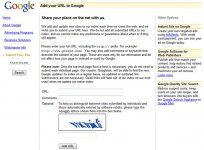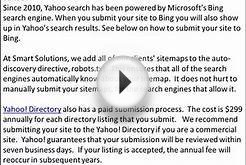Once you've built your site, the next step is to get visitors to it.
Search engine rankings is a world of myths, out-of-date information, and big money. Chances are, if you done some research on this subject, you've found companies offering to submit your site to 1, 000 search engines, 10, 000 search engines, 100, 000 search engines, and so on. Before we start, let's get this straight. There are around 10 search engines that matter. Their names are household names like Google, MSN, Yahoo, etc. You want to get listed with them, because they take 98.5% of the web searches (according to a Yahoo Finance Article).
So how do search engines work?
The truth of the matter is that no-one knows exactly. Most of what we know about Search Engine Optimization is derived from our own experiences, so different people will have different advice. Here's a basic overview of the common things that search engines like:
Got links?
Most search engines today (the ones that matter anyway) work as spiders, crawling links on the internet. In other words, they read web pages, looking for links to other web pages. The more links they find to a web page the more important that page must be. There is often no need to submit your site to them if other people link to your site, because the spiders will follow them to you. If you don't have other folks linking to your site, then submitting to the major search engines is still a good way to get the spiders started.There are two types of links. Inbound and outbound. Inbound links are from another site to you, and act like 'votes' for your site. Outbound links are from you to someone else, and act like votes for someone else - you don't feel any benefit from it. If you have too many outbound links it might even negatively affect your ranking. So what you really want is for hundreds of people to voluntarily link to you. Depending on who you are and what your site contains, that probably won't happen, so you're going to have to arrange to make it happen!
Many people will be prepared to exchange links - they link to you in exchange for a link back. This is a good way to get your sites name out there, but ultimately you want one way links to you.
Directories are also a good way to get links to your site. Some charge, but there are many free ones around. The Open Directory Project (also known as the ODP or DMOZ) is one of the most important, if not the most important. Why? Simply because it's mirrored everywhere by other people in different countries, which gets you lots of backlinks from one submission. It also powers the Google Directory.
Forums are another option, but don't go round posting random posts like 'visit my wonderful new site at my.com'. This is usually considered very impolite-spamming... Some forums will allow you to link to your site in your signature. If you have useful content on your site you could link to it in a relevant discussion on a forum - e.g. if someone posts asking for information on a technique that you've used, you could post a link to that site as part of your answer.
Content?
The spider then reads the page, looking for keywords. You've probably heard a lot about putting keywords into your meta tags to get search engines to list you. You don't need meta-tags to get listed with the main search engines. You need content on your page. If you do use meta-tags then you need to make sure they really match your content - otherwise search engines might get the idea that you're trying to cheat.
The best way to get people to link to your site is to provide useful content. Articles for instance, like the one you're reading now! Chances are you got to this site either through one of the 209, 000 links to HTML Goodies (at the time of writing), or through a search engine which followed those links.
Are you sure you've got content?
I know you're giving me funny looks through the screen, but this is important. You see, search engines don't see your site like Internet Explorer does. They see text. So you need to check your website can be read properly by search engines.
Things to watch out for include:
- Javascript: You might have the most wonderful JavaScript powered menu in the world, but search engines don't usually read JavaScript. So make sure your menu is useable without it.
- Images: there is a property for images called 'alternate text'. You see it used like this: Make sure you use it - it's all the search engine will see of your wonderful graphics, and that makes it important!
- Clean code: If your site uses the first 500 lines just setting up your nested tables and rollover JavaScript effects, the important stuff gets pushed further down the page. Most search engines appear to stop reading your page after a certain point - usually a file size limit. If your site is listed, you can click the 'cached' button on most search engines to find out how much of your page it has read.
- Structured code: Make sure your headings are marked up as headings (using
etc) not a mix of bold and font tags. Heading tags are ranked as more important than bold tags, so use them and get your keywords into them. Don't forget you can use CSS to style the heading tags exactly as you want them, so you don't lose anything in terms of formatting.
- Fancy fonts as images: Many people use images to get fancy fonts into their headings. If you're one of those people, you can markup your code as follows: (swap the h1 for the level of heading you need)
- Title: There is a title tag buried in the head section of your page. Use it and make sure it's relevant - most search engines will use its content as the title of your listing.
Submit to Search Engines
As we've already mentioned, submitting isn't really necessary, but most search engines offer the option to submit your site. Here are the main URLs:
Three Steps to Search Engine Optimization
So, to conclude, there are three main aspects to SEO.
- Start with your code: you need to optimize your code to make it easy for the search engine to see what your page is about.
- Next you need content: make your site worth linking to, and finally:
- Get people linking to you!



![How to Build a Website Search Engines Love [SEO#015]](/img/video/how_to_build_a_website_search.jpg)







